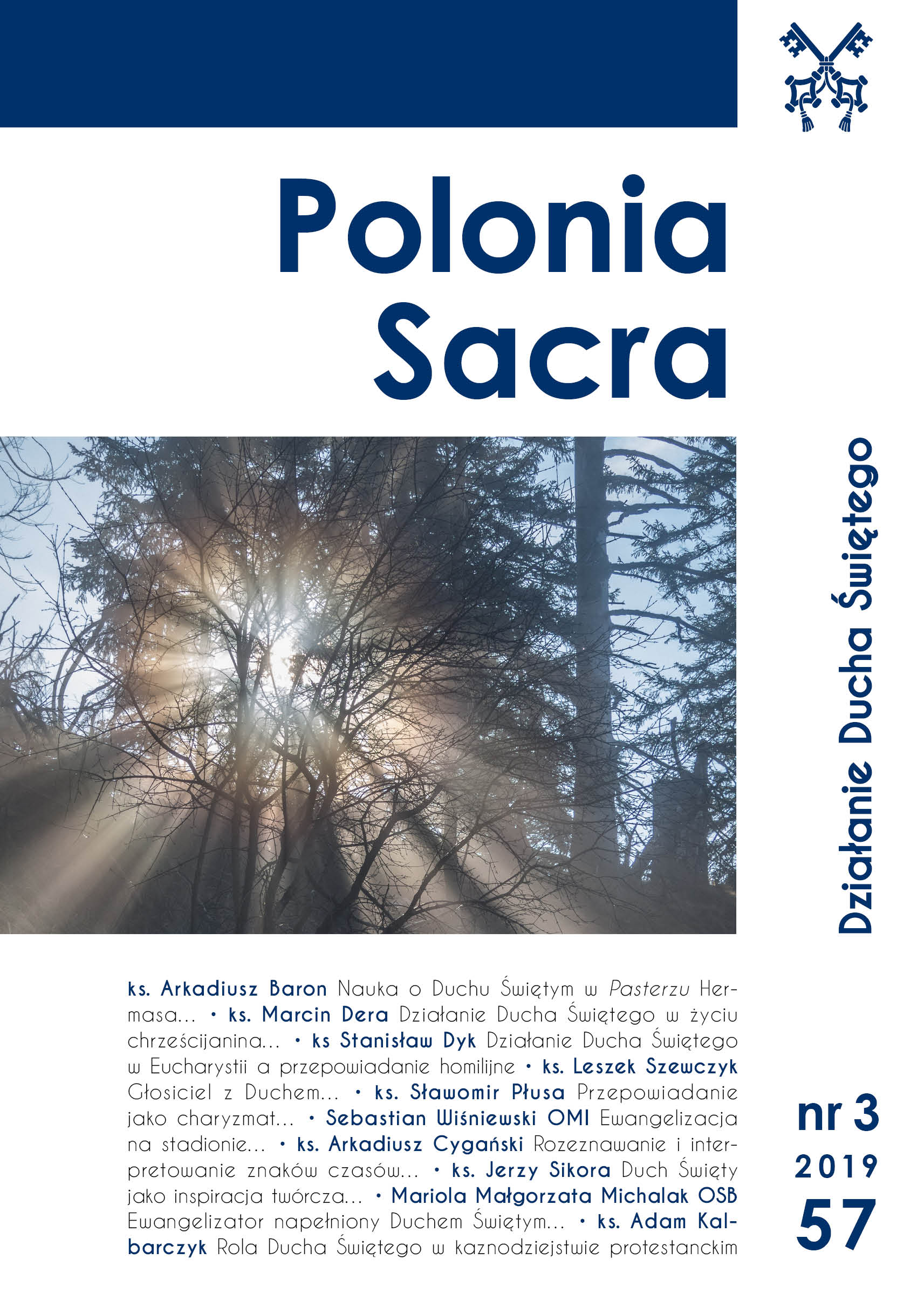Rola Ducha Świętego w kaznodziejstwie protestanckim
DOI:
https://doi.org/10.15633/ps.3392Słowa kluczowe:
Duch Święty, kaznodziejstwo protestanckieAbstrakt
W obrębie protestantyzmu kaznodziejstwo traktowane jest jako główne zadanie Kościoła. Teologia luterańska widzi w kazaniu uobecnienie Chrystusa i źródło usprawiedliwiającej wiary rodzącej się ze słuchania i przyjęcia głoszonego słowa, jak też miejsce działania Ducha Świętego, który wznieca wiarę w tych, którzy słuchają Ewangelii. Dla ojca reformacji, Marcina Lutra, działanie Ducha Świętego jest ściśle związane z Ewangelią, która została przez Niego natchniona i dzięki Jego wsparciu może być w ogóle głoszona i słyszana. Zaś według Jana Kalwina, to Duch Święty jest prawdziwym nauczycielem (magister) i sprawcą (effector), który jako właściwy Autor kazania czyni zeń zbawcze wydarzenie.
Przypisanie Trzeciej Osobie Boskiej istotnej roli w głoszeniu słowa Bożego zrodziło pytanie o to, co w kazaniu jest dziełem Boga, a co dziełem człowieka. Poszukiwania w tej materii takich dwudziestowiecznych teologów protestanckich jak Rudolf Bohren, Manfred Josuttis czy (późny) Karl Barth, doprowadziły do stworzenia teorii kaznodziejstwa opartej na paradygmacie pneumatologicznym. Jest ona próbą teologicznego uzasadnienia połączenia elementu boskiego i ludzkiego w kazaniu. To w Duchu Świętym, który chce działać w nas i poprzez nas (zasada teonomicznej obopólności), kaznodziejstwo, widziane jako leżące całkowicie w możliwościach Boga, staje się całkowicie rzeczą kaznodziei i rzeczą słuchacza, leży całkowicie w możliwościach człowiekazarówno w sztuce, jak i technice – pod warunkiem, że zarówno kaznodzieja, jak i słuchacz będą otwarci na Jego działanie. Homiletyka pneumatologiczna dała nie tylko odpowiedź na pytanie o stopień aktywności Boga i człowieka w procesie kazania, lecz także jeszcze wnikliwiej opisała przemożną rolę Ducha Świętego w kaznodziejstwie.
Bibliografia
Barth K., Das Wort Gottes und die Theologie, München 1924.
Barth K., Homiletik. Wesen und Vorbereitung der Predigt, Zürich 1966.
Bohren R., Predigtlehre, München 1971.
Bohren R., Das Gott schön werde. Praktische Theologie als theologische Ästhetik, München 1975.
Chrzanowski D., Zwiastowanie Słowa Bożego w świetle dokumentów Kościoła Ewangelicko-Augsburskiego w RP, „Roczniki Teologiczne” 64 (2017) nr 12, s. 19–30.
Dorosz K., Jan Kalwin, czyli mądrość poznania, „Znak” 657 (2010) nr 2, s. 84–90.
Josuttis M., Einführung in das Leben, Gütersloh 1996.
Josuttis M., Offene Geheimnisse. Predigten, Gütersloh 1999.
Konik T., Urząd kościelny w księgach wyznaniowych luteranizmu do 1537 roku, w: Teologia wiary. Teologia ks. Marcina Lutra i ksiąg wyznaniowych Kościoła Luterańskiego, red. M. Uglorz, Bielsko-Biała 2007, s. 234–249.
Księgi Wyznaniowe Kościoła Luterańskiego, Bielsko-Biała 1999.
Luter M., Postylla domowa, Cieszyn 1883.
Lämmlin G., Die Lust am Wort und der Widerstand der Schrift. Homiletische Re-Lektüre des Psalters, Münster 2002.
Mały i Duży Katechizm Doktora Marcina Lutra, tłum. A. Wantuła, Warszawa 1973.
Ruler A. A. van, Structuurverschillen tussen het christologische en het pneumatologische Gezichtspunt, w: De spritu sancto. Bijdragen tot de leer van de Heilige Geest bij gelegenheid van de 2e eeuwfeest van het Stipendium Bernardinum, Utrecht 1964, s. 205–227.
Simon H., Kaznodziejstwo w Kościołach protestanckich, w: Encyklopedia katolicka, t. 8, red. B. Migut, Lublin 2000, k. 1316–1319.
Uglorz M., Sola scriptura. Teologia wiary. Teologia ks. Marcina Lutra i ksiąg wyznaniowych Kościoła Luterańskiego, red. M. Uglorz, Bielsko-Biała 2007, s. 272–285.
Wantuła A., Zarys homiletyki ewangelickiej, Warszawa 1974
Pobrania
Opublikowane
Numer
Dział
Licencja
Autorzy publikujący w czasopiśmie udzielają jego wydawcy zgody o następującej treści:
- Autor zachowuje autorskie prawa majątkowe do utworu, a jednocześnie udziela wydawcy czasopisma zgody na jego pierwszą publikację w wersji drukowanej i wersji online na licencji Creative Commons Uznanie autorstwa 4.0 Międzynarodowe oraz zgody na wykonywanie opracowań, w tym przekładów.
- Autor ma możliwość udzielania zgody niewyłącznej na opublikowanie utworu w wersji, która ukazała się w czasopiśmie (np. zamieszczenia go w repozytorium instytucjonalnym lub opublikowania w książce), wraz z informacją o jego pierwszej publikacji w czasopiśmie.
- Autor może umieścić swój utwór online (np. w repozytorium instytucjonalnym lub na swojej stronie internetowej) jeszcze przed zgłoszeniem utworu do czasopisma.

